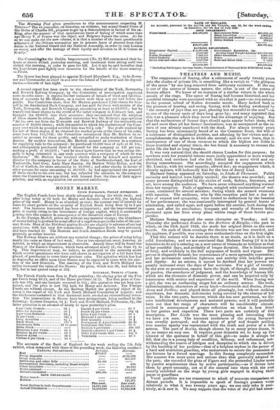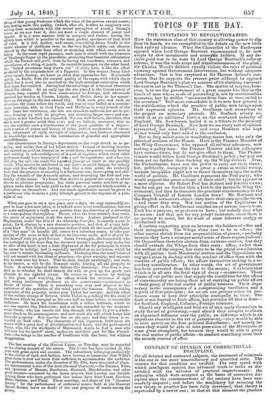THEATRES AND MUSIC.
The reappearance of Sontag, after a retirement of nearly twenty years into the shades of private life, is something like a revisit to " the glimpses of the moon " by one long removed from sublunary existence. If the one is out of the course of human nature, the other is out of the course of human affairs. We know of no instance of a similar return in the whole annals of the stage. The name of Sontag had become historical, and her youthful triumphs were associated with an mra that is past—an sera anterior to the present school of Italian dramatic music. Many looked back to the pleasure of hearing and seeing Sontag, with the feeling awakened by " the memory of joys that are past, pleasing but mournful to the soul"—as to one of the sunny spots of days long gone by; and many regretted that this was a pleasure which they never had the advantage of enjoying. But that the enchantress of former days should again appear before them, with all and more than all her former fascinations, was as unexpected as the re- turn of one already numbered with the dead. For almost twenty years Sontag has been occasionally heard of as the Countess Rossi, the wife of a nobleman of distinguished position, and adorning by her virtues and ac- complishments the sphere in which she moved; and we now learn, that in consequence of one of those reverses to which the highest are liable in these troubled and stormy times, she has found it necessary to resume the artist life she had so long forsaken.
It was very natural that she should choose London for this purpose; for nowhere were her youthful talents more justly appreciated or more warmly cherished, and nowhere had she left behind her a more vivid and en- during remembrance. She accordingly accepted the engagement which Mr. Lumley, with his usual sagacity, offered her; an engagement which, it already appears, will indemnify him for the loss of Jenny Lind.
Madame Sontag appeared on Saturday, in Linda di Chamouni. Public curiosity and interest were highly excited; the theatre was crowded; and many persons distinguished in the circles of rank, fashion, literature, and art, were among the audience. We have never witnessed anything warmer than her reception. Peals of applause, mingled with exclamations of wel- come, continued for several minutes; during which she seemed overcome with emotion. The audience, Who by this reception paid her a due tri- bute of respect and sympathy, were roused to enthusiasm by the beauties of her performance: she was continually interrupted by general bursts of admiration, and called again and again before the curtain, both during the opera and after its conclusion; bouquets and wreaths of flowers being showered upon her from every place within range of those festive pro- jectiles.
Madame Sontag repeated the same character on Tuesday; and on Thursday she performed Rosh= in the Barbiere di Siviglia,—the part in which, on the 15th April 1828, she made her original debat on the same boards. On each of these evenings the theatre was not less crowded, and the applause, if possible, was even more enthusiastic than on the first night.
That this success will be durable there is no doubt, as it is built on a solid foundation; and we are convinced that Madame Sontag (if it is her intention to do so) is entering on a new career of triumphs as brilliant as that of her youthful days, and probably of longer duration. She is little tamed of forty, and evidently in the full enjoyment of health and vigour. Her person is elegantly formed; her countenance of a most agreeable expression; and her movements combine lightness and activity with ladylike grace and dignity. As an actress it cannot be doubted that her powers are greatly increased since the clays of her noviciate. For a girl of twenty, be she ever so precocious, cannot have the depth of' thought, the intensity of passion, the soundness of judgment, and the knowledge of human life, which are the elements of dramatic power, and can be acquired only by intercourse with society and experience of the world. When Sontag was a girl, she was an enchanting singer but an ordinary actress. She took, indiscriminately, characters of every kind—Semiramide and Rosina, Donna Anna and Zerlina; and played them all pleasingly, but without striking excellence, her dramatic deficiencies being covered by the charms of her voice. In the two parts, however, which she has now performed, we dis- cern intellectual development and matured powers; and it will probably turn out that her range of characters will be considerably circum- scribed in consequence of greater reflection on what is best fitted to her genius and capacities. These two parts are certainly of this description. Der Linda was the most pleasing and interesting that we have yet seen. The innocent tenderness of the young Savoyard was sweetly portrayed; and the agony of grief and despair settling into maniac apathy was represented with the truth and power of a fine actress. The part of Rosina, though chosen by so many prime donne, is by no means an easy one. It requires great dramatic art to keep up the interest of the spectator in behalf of this girl—to make it always be felt that she is a young lady of condition, delicacy, and refinement, not- withstanding the course of intrigue and deception to which she is driven by the hardship of her position—that of a helpless orphan in the power of a hard and avaricious guardian, who endeavours to secure the possession of her fortune by a forced marriage. In this Sontag completely succeeded. Her manner was more quiet and serious than that generally adopted in the part; she seconded the plots of Figaro and the pretended Lindor more by passive acquiescence than by active participation,—as if driven into them by grave necessity, not as if she entered into them with the zest usually exhibited on the stage by young girls engaged in duping their papas or guardians.
Vocal qualities are too evanescent to admit of accurate comparison at distant periods. It is impossible to speak of` Sontag's present voice relatively. to what it was twenty years ago; we can only take it posi- tively, as it now is. We may suppose that the voice of the girl had some- thing of that young freshness which the voice of the matron cannot retain; bat, setting aside this quality, (which, after all, is often an imaginary one, arising from association with the actual perception of youth,) ,Sontag's voice, as we now hear it, does not want a single element of power and beauty. It is a true soprano both in compass and timbre; having the silvery tone which is peculiar to the mest perfect specimens of that kind of voice. It is full, mellow, and sweet, resembling Jenny Lind's in the entire absence of shrillness even in the very -highest notes,—an absence caused by the freedom from effort or straining with which every note is taken. In the most rapid passages, each note is struck with the clearness d Thalberes finger on the pianoforte; producing that beautiful articulation which the French callper/e, from its having the roundness, evenness, and smoothness, of a string of pearls. In cantabile passages, on the other hand, the "linked sweetness long drawn out" of every tone, is like the effect produced by the exquisite bow of a Pag,anini. In this respect Jenny Lind alone equals Sontag; we know no other that approaches her. It proceeds partly, no doubt, from the natural quality of the organ with which she is gifted, but it must also be ascribed to the high artistical cultivation which that organ has received. Sontag had the advantage of a musical education which few obtain. At an early age she was placed in the Conservatory of Prague, long reputed the best music-school in Europe, and afterwards pursued her studies at Vienna, Leipsic, and Berlin, down to her appear- ance on the stage in the last-named city. With such gifts and such an education she came before the world, and was at once hailed as a consum- mate musician, able to rival Pasta and Malibrau in every branch of the art. Since her retirement, she has not ceased to cultivate her art in pri- vate; keeping up with its progress, and obtaining larger views and con- ceptions as her intellect has expanded. We can well believe, therefore, that she is now a greater artist than ever; and we believe, moreover, that no one else exhibits such a combination of the great qualities of a singer— such a union of power and beauty of voice, perfect mechanism of execu- tion, refinement of style, strength of expression, and boldness chastened by knowledge and taste in the introduction of graceful and appropriate embellishment.
One circumstance in Sontag's deportment on the stage struck us as pe- culiar, and unlike that of her fellow artists. Instead of desiring encores, she showed an evident disposition to avoid them; frequently merely bowing and retiring in acknowledgment of a peal of applause which every other performer would have interpreted into a call for repetition; and when she did obey the call, she made the repeated passage as short as she possibly could. This cannot be attributed to any desire to avoid fatigue, for nobody sings with less effort than Sontag; but, like a true artist, she evidently feels that the practice of encoring is a barbarous one, interrupting and cha- fing the warmth of the dramatic action, and destroying the flow and con- tinuity of the music. We know that artists in general are ready to admit this as an abstract proposition; but their personal vanity and love of ap- plause make them not only yield to but court a practice which confers a distinction on themselves. And too much approbation cannot be given to a performer who disdains a petty triumph gained at the expense of a prin- ciple of art.



























 Previous page
Previous page